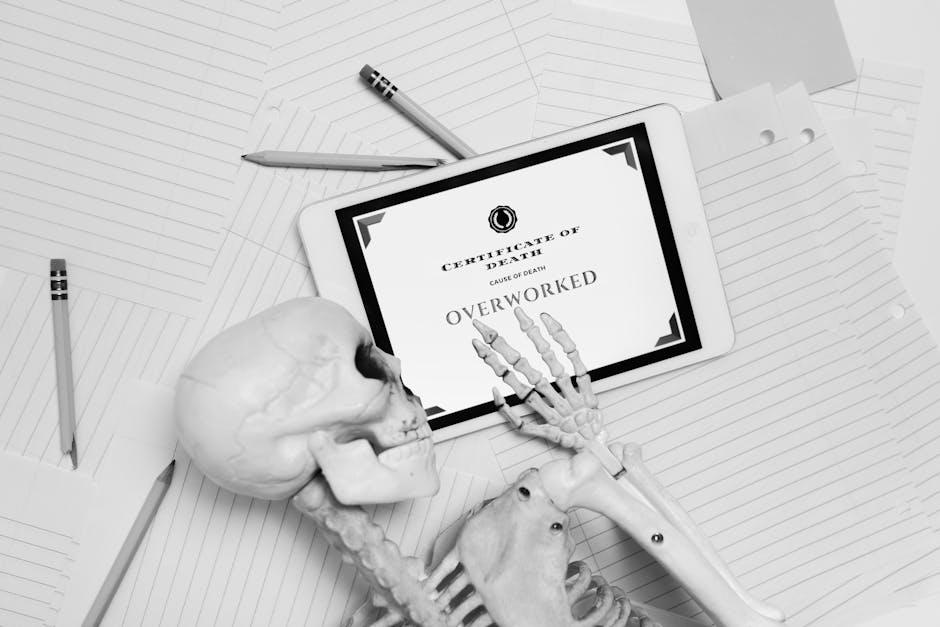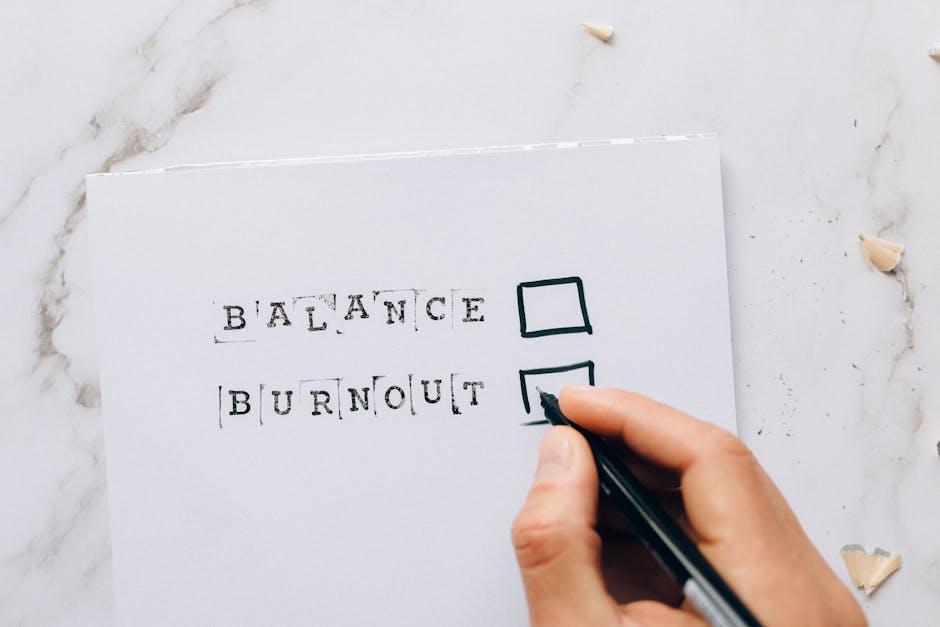In the fast-paced whirl of modern life, where every hour seems pocketed with endless tasks and relentless deadlines, finding equilibrium can feel like chasing a mirage. The pursuit of success often tips the scales toward exhaustion, turning vibrant ambition into weary burnout. Yet, amid the chaos, there exists a mindful path—a balancing act that harmonizes productivity with well-being. This article explores smart strategies to prevent busy life burnout, offering practical insights to help you reclaim calm, cultivate resilience, and sustain your energy in a world that never slows down.
Table of Contents
- Understanding the Root Causes of Burnout in a Fast-Paced World
- Incorporating Mindful Time Management to Reclaim Your Energy
- Building Resilient Routines That Support Mental Wellbeing
- Practical Techniques to Disconnect and Recharge Amidst Daily Demands
- Insights and Conclusions

Understanding the Root Causes of Burnout in a Fast-Paced World
In today’s relentlessly fast-moving environment, burnout doesn’t arise from just doing too much—it’s born from a complex web of psychological and social factors. At the core lies the feeling of being perpetually “on,” where work, social, and personal demands collide without clear boundaries. Individuals often struggle not just with quantity but the quality of stressors, such as unrealistic expectations, lack of control, and insufficient support. This cocktail of pressures creates a perfect storm where exhaustion seeps beyond the physical realm, deeply impacting emotional resilience and mental clarity.
Understanding these root causes is essential for crafting effective preventive measures. Key contributors include:
- Chronic Multitasking: Splitting attention across tasks fragments focus and energy, accelerating fatigue.
- Blurred Work-Life Boundaries: The digital age makes unplugging difficult, resulting in constant cognitive strain.
- Social Isolation: Paradoxically, busyness can dismantle meaningful connections, which are vital for emotional recharge.
- Unrealistic Productivity Expectations: Cultural and workplace norms often glorify “busy,” ignoring sustainable pacing.
| Root Cause | Impact | Suggested Countermeasure |
|---|---|---|
| Chronic Multitasking | Mental fatigue and reduced output | Practice focused, single-task work blocks |
| Blurred Boundaries | Constant stress activation | Define clear “offline” hours, digital detox |
| Social Isolation | Weakened emotional support | Schedule regular social engagements |
| Unrealistic Expectations | Chronic dissatisfaction and overwhelm | Set attainable goals and practice self-compassion |

Incorporating Mindful Time Management to Reclaim Your Energy
Embracing a mindful approach to managing your time means more than just scheduling tasks; it requires a conscious awareness of how you spend each moment and its impact on your well-being. Prioritize tasks not solely by urgency but by their alignment with your energy levels and personal values. This practice nurtures a flow where activities invigorate rather than drain you, allowing for intentional pauses that recharge your mental and physical reserves. Consider integrating brief mindfulness techniques, such as focused breathing or gentle stretches, during transitions between commitments to reset your focus and maintain calm energy throughout your day.
To effectively reclaim your vitality, develop a personalized rhythm that accommodates work demands and self-care rituals. This can be broken down into actionable steps:
- Identify energy peaks: Map out when you feel most alert and schedule challenging tasks accordingly.
- Block time for breaks: Intentionally carve out moments to detach and refresh.
- Limit multitasking: Focus on one meaningful task at a time to enhance efficiency and reduce stress.
| Time of Day | Energy Level | Suggested Activity |
|---|---|---|
| Morning | High | Complex problem-solving |
| Midday | Moderate | Emails and meetings |
| Afternoon | Low | Routine tasks or mindfulness breaks |

Building Resilient Routines That Support Mental Wellbeing
Creating a daily framework that nurtures your mental health requires more than just sticking to a checklist—it demands intentional flexibility and self-awareness. Begin by cultivating morning and evening rituals that anchor your day with calm and purpose. These routines could include simple mindfulness exercises such as deep breathing or journaling, which reset your mind and prepare it for the day ahead or gently unwind it at night. Remember, the goal isn’t perfection, but a repetition of nurturing moments that build emotional stamina over time.
To further embed resilience, integrate the following habits into your lifestyle:
- Consistent Sleep Patterns: Aim for regular sleep schedules to regulate your body clock.
- Scheduled Digital Detoxes: Designate times free from screens to reduce cognitive overload.
- Physical Movement: Even short, mindful walks can shift your mental state positively.
- Goal-Setting with Flexibility: Set manageable targets that allow room for adaptation without self-judgment.
| Routine Element | Benefit |
|---|---|
| Morning Mindfulness | Enhances focus and reduces anxiety |
| Evening Journaling | Promotes emotional clarity and restful sleep |
| Digital Detox | Lowers stress and improves mental presence |
| Consistent Sleep | Boosts mood and cognitive function |

Practical Techniques to Disconnect and Recharge Amidst Daily Demands
Amidst the hustle and bustle of daily responsibilities, carving out moments for yourself is essential. Start by incorporating micro-breaks throughout your day—short, deliberate pauses that allow your mind to reset. Whether it’s a five-minute stretch, a quick meditation, or simply stepping outside to breathe fresh air, these tiny intervals accumulate into significant mental clarity and reduced stress. Another powerful method is creating a “tech curfew”—setting boundaries on screen time after work hours to detach from the constant buzz of notifications and digital overload.
To make disconnection more tangible, design a personal recharge ritual tailored to your preferences. This is the time to engage in activities that replenish your energy, such as journaling, listening to calming music, or immersing in a creative hobby. Here’s a simple table outlining effective recharge techniques and their benefits, crafted to fit seamlessly into busy schedules:
| Technique | Duration | Benefit |
|---|---|---|
| Mindful Breathing | 3-5 mins | Reduces anxiety, boosts focus |
| Nature Walk | 10-15 mins | Enhances mood, clears mind |
| Creative Expression | 15-30 mins | Ignites joy, relieves stress |
| Digital Detox | 1-2 hours | Restores attention, improves sleep |
Implementing these strategies consistently fosters a healthier balance, empowering you to handle daily demands with a refreshed spirit and a clearer mind.
Insights and Conclusions
In the ceaseless rhythm of modern life, mastering the balancing act between responsibility and self-care is no small feat. Yet, by embracing smart strategies—setting mindful boundaries, prioritizing what truly matters, and gifting ourselves moments of stillness—we can transform the chaos into a harmonious flow. Preventing burnout isn’t about perfection; it’s about resilience, awareness, and gentle persistence. As you navigate your busy days, remember that balance is not a final destination but an ongoing dance, one that invites you to listen deeply, adjust gracefully, and nurture your well-being every step of the way.



